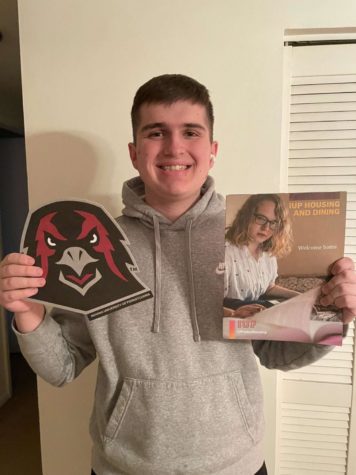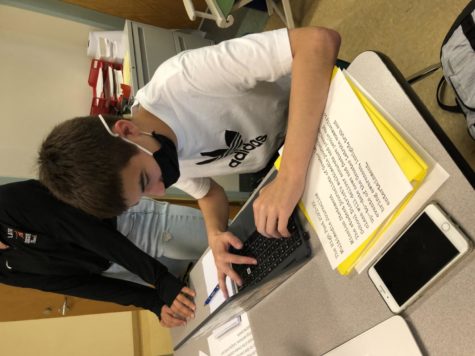Quinn Hill and Trent Jones Take On College Decision Process
“If there’s a place that checks all of the boxes then everyone would go there,” said senior Quinn Hill.
Quinn summed up the college decision process best with that one sentence. Every college has benefits and drawbacks that an individual student has to evaluate based on his wants and needs. Most importantly, cost, campus lifestyle, and a college’s success with a specific major play heavily into the decision-making process. Quinn, alongside fellow senior Trent Jones, learned lessons throughout the process. It led to Quinn to choose West Virginia for Finance and Trent for Secondary History Teaching at IUP.
The process of getting to where they are now started over the summer. Both Quinn and Trent took visits throughout summer before the senior year. Quinn visited West Virginia, Pitt, Robert Morris, and Penn State. Trent looked at Duquesne, Pitt, and IUP. Getting a jump on visits early is a good idea to get an idea of what a school has to offer. Prospective students can learn more about a specific major at the school and get a solid idea of what kind of campus they want to make home for the next four years.
Both also applied early in September. Hill stated, “Get it done and out of the way early. Do stuff in the summer, in August. I could’ve applied in August, but I didn’t. A tip to people: you have to just do it and get it over with.”
Another tip Quinn shared was to use the tools on the CommonApp. “Don’t apply individually through every single school. Some people were applying through six different schools. It’s a lot easier with CommonApp. Apply for a lot of scholarships, too, ” said Hill. CommonApp is a website that allows students to fill out biographic information and do their essay for each college they’re applying to just once. After that, students will only have to do a few college specific questions on their applications. This speeds up the application process and makes life easier for seniors.
Jones added the importance of filling out the FAFSA when that time comes in October. FAFSA stands for Free Application for Federal Student Aid. It is a crucial thing for all students to fill out. The FAFSA is where students apply for federal need-based aid in the form of grants or loans to help them better afford college.
When it came time to apply, Quinn applied to West Virginia, Pitt, Penn State, Robert Morris, Duquesne, Washington and Jefferson College, Allegheny College, and Seton Hill. He applied to those institutions because of their proximity to home, the quality of finance programs, and his ability to be accepted by those colleges. Trent sent applications to Seton Hill, Pitt, Penn State, IUP, Robert Morris, Duquesne, and West Virginia. Trent mainly chose those schools because they were close to home.
Both Quinn and Trent understood and valued the importance of getting the process done in the summer. By being proactive a lot of stress during the school year by sending out applications over the summer can be alleviated. Applying early, they could put all of their focus during the school year into their schoolwork and not have to worry about filling out the paperwork, essays, and transcripts that come with the process. Each of them heard back from most of their schools before Christmas and made the final decision of the best fit school in February. After hearing back from all of the colleges, it was time for Hill and Jones to address each school individually and find their match.
For Quinn, it came down to Pitt and West Virginia. He weighed positives and negatives of both colleges closely before making his choice. “I was looking for, in no particular order, proximity to home, affordability, quality of major, and job placement. Also, location. I just want to land a good job. That’s what I’m going to college for,” said Hill.
Cost of attendance played an important role for Quinn’s decision. He said, “After scholarships, West Virginia came out to $16,538 per year compared to $38,000 per year at Pitt. The difference was too much for me to ignore.”
The campus at West Virginia caught Quinn’s eye favorably compared to Pitt. He stated, “At West Virginia, there was a lot of greenery and an open environment. At Pitt, it felt like there was no greenery. The urban environment wasn’t a match for me. My taste fits better at West Virginia. I don’t want to spend four years at a place where I don’t like how it looks.”
Finally, Quinn evaluated the finance programs at Pitt and West Virginia. Hill said, “Pitt had great access to the city and economic opportunity and was closer to home, but West Virginia valued their B&E (Business and Economics) school more. West Virginia just finished a new, state of the art B&E school that I got to tour. Pitt didn’t show me their B&E school. It felt like West Virginia valued me and my major more than Pitt.”
Combining cost, campus, and major together is what led Quinn to choosing West Virginia. It is important for students to take a deep look into the colleges they’re considering, like Quinn, so that they find their ideal home for the next four years.

Duquesne, West Virginia, and IUP were the leaders for Trent. Like Quinn, he broke down each level that ultimately led him to IUP.
In regards to cost, Trent said, “Cost of attendance was the entire factor basically. IUP cost $12,000 per year, while Duquesne was $27,000 and West Virginia was $22,000. IUP was more affordable than any of my other options because of the scholarships and other financial aid they offered me.”
The campus lifestyle at IUP factored heavily for Trent. He said, “IUP has smaller class sizes compared to other schools I looked at. Outside of big lectures, classes were around 20-25 students, which I appreciated. Also, they have newly renovated dorms that stood out to me. When I compared them to Duquesne, it was a no-brainer. The dorms at Duquesne weren’t nearly as nice and cost much more.”
Finally, IUP’s history for producing teachers appealed to Trent. Jones stated, “IUP started as a teaching school so that was the big kicker for me. I definitely want to get my degree in teaching and use that to achieve my dream of becoming a history teacher. I believe that IUP is the best place for me as someone trying to become a teacher.”
The affordability, campus, and success with teachers at IUP led Trent to making a decision he can feel proud of. He utilized the resources available to him to make an educated decision that best suits his needs, which is important for all seniors to do.

The lessons Quinn Hill and Trent Jones learned throughout the application and college admissions process about getting things done early and evaluating their options will help them as they move on past high school. The process helps people learn as much about themselves as they do the schools they’re considering. Many high schoolers don’t know much outside of the bubble of the school, so going out of the Latrobe area and exploring new places opens up a plethora of opportunities for seniors to understand what they value in life. When making one of the most important decisions in life, it’s vital to leave no stone unturned. Quinn and Trent exemplify that and are a great example of students at Greater Latrobe taking initiative for what they want their life to be.

Michael Giorgianni, who goes by Mikey, is a senior at Greater Latrobe Senior High School. He has attended the Greater Latrobe School District throughout...












